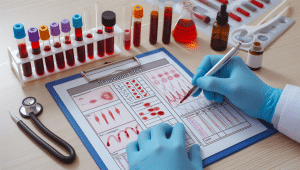What is a Vitamin D Test?
A Vitamin D Test measures the levels of Vitamin D in your blood. Vitamin D is a fat-soluble vitamin crucial for various bodily functions, particularly calcium absorption, bone health, and immune system function. While your body can produce Vitamin D when exposed to sunlight, dietary sources and supplements are also important for maintaining adequate levels.
Why Do You Need a Vitamin D Test?
A healthcare provider might recommend this test if they suspect:
- Vitamin D deficiency: Symptoms like fatigue, bone pain, muscle weakness, or frequent infections might warrant the test.
- Monitoring vitamin D supplementation: Individuals taking Vitamin D supplements might require periodic monitoring to ensure appropriate levels.
- Assessing certain medical conditions: Conditions affecting calcium absorption or bone health might necessitate this test.
What Does a Vitamin D Test Measure?
The most common type of Vitamin D test measures the level of 25-hydroxyvitamin D (25(OH)D), which reflects both dietary intake and Vitamin D produced by the body. It can indirectly reveal:
- Vitamin D status: Whether you have sufficient, deficient, or excessive levels of Vitamin D.
- Potential health risks: Vitamin D deficiency can increase the risk of osteoporosis, fractures, and other health problems.
- Underlying conditions: Abnormal levels might signal issues with calcium absorption or other medical conditions.
Preparing for the Test
Generally, no special preparation is needed for a Vitamin D test. However:
- Fasting: Some labs might recommend fasting for a few hours before the test. Check with your healthcare provider beforehand.
- Medications: Inform your doctor about any medications or supplements you’re taking, as some can affect Vitamin D levels.
Understanding the Results
Normal 25(OH)D levels typically range between 30-100 ng/mL. However, optimal levels might vary depending on individual factors and specific health conditions.
- Low levels (deficiency): This increases the risk of osteoporosis, fractures, muscle weakness, and other health problems.
- High levels (toxicity): While rare, excessive Vitamin D intake, especially from supplements, can lead to calcium buildup in the blood, causing nausea, vomiting, weakness, and even kidney damage.
- Normal levels: Indicate adequate Vitamin D status.
Risk Factors and Prevention
Factors that increase the risk of Vitamin D deficiency include:
- Limited sun exposure: Spending most time indoors or living in areas with limited sunlight reduces the body’s Vitamin D production.
- Darker skin: Higher melanin levels in darker skin reduce Vitamin D synthesis from sunlight.
- Older age: The ability to produce Vitamin D from sunlight decreases with age.
- Obesity: Vitamin D can get trapped in body fat, making it less available for use.
- Malabsorption disorders: Certain conditions can impair Vitamin D absorption.
Prevention and management involve:
- Sun exposure: Get safe sun exposure for a short duration each day.
- Diet: Include Vitamin D-rich foods like fatty fish, egg yolks, and fortified dairy products.
- Supplementation: Your doctor might recommend Vitamin D supplements if dietary intake and sun exposure are insufficient.
- Addressing underlying conditions: Treating any conditions that affect Vitamin D absorption or metabolism is important.
Remember, maintaining adequate Vitamin D levels is crucial for overall health, particularly bone health. If you suspect any deficiency or have risk factors, consult with your healthcare provider for appropriate guidance.

 7351982473
7351982473











